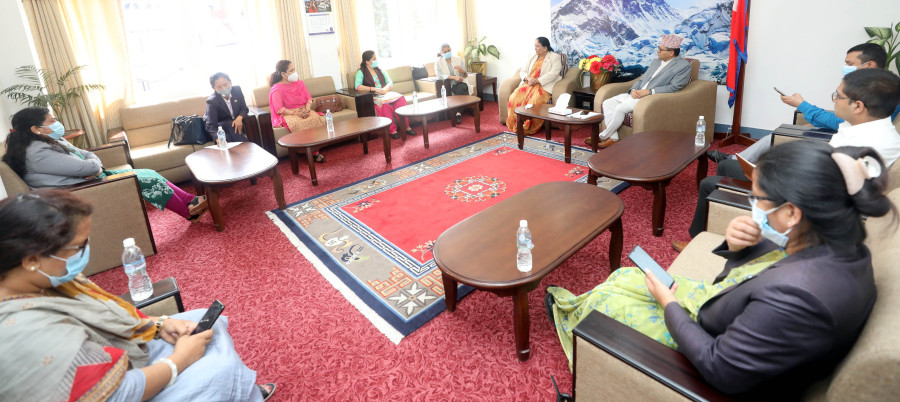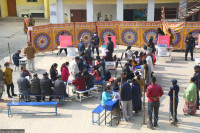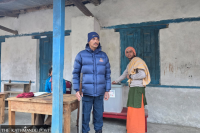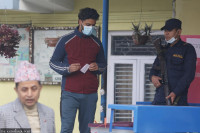National
Women lawmakers lobby for harsher penalties for rape
As cases of sexual violence have continued to go up despite increased jail term, women lawmakers want rapists to be chemically castrated.
Binod Ghimire
Every night Shanta Chaudhary, Nepal Communist Party whip, prays that there are no news on rape in the next morning’s papers. She says the increasing cases of rape and sexual assaults have haunted her so much that she fears that her relatives may fall victims of the gruesome crime.
“As a woman it is terrifying waking up to the news of rape and sexual violence every day,” she said. “Where is our society heading?”
[Read: Harsh laws are prepared but not always implemented effectively, past records show]
Chaudhary along with her female colleagues in the House of Representatives and the National Assembly have been lobbying for a revision in the penalty in rape cases.
The cross-party women lawmakers from both the Houses have formed a loose network to lobby for stricter penalties for rape perpetrators and to advocate justice for the survivors and victims of rape and sexual assaults. Their meeting on September 28 concluded that increasing the penalties including capital punishment if possible, was necessary as a deterrent measure to minimise the crime.
But the constitution does not allow capital punishment in the country.
“We are for incorporating a provision of chemical castration, at the minimum, so that the person involved in the heinous act is sexually inactive,” she said. “There should also be provisions of labour camp internment and life imprisonment depending upon the severity of the case.”
According to urologist and surgeon Dr Jagdish Lal Baidya, a male can stop having an erection as long as he takes medication that contains estrogen, a female hormone.
“But as soon as one stops taking it, he can have erection again,” Baidya said. “The only way to ensure that a man does not have an erection permanently is by undergoing a surgical procedure.”
As a part of their lobbying, the women lawmakers on Thursday met Agni Sapkota, speaker of the House of Representatives, and Ganesh Prasad Timilsina, chairperson of the National Assembly, seeking their support in incorporating severe penalties in cases of rape of minors and in the cases of murder after rape.
They say they concluded that inclusion of stern provisions was necessary as the existing legal provisions have failed to act as a deterrent to control the crime.
Pushpa Bhusal, a whip of Nepali Congress, said the fact that the cases of rape and murder after rape have increased despite increse in the length of imprisonment shows there is a need of sterner legal provisions.
“An increase in the penalty is necessary to discourage one from committing crime as having severe penalties will make them [potential perpetrators of the crime] think before committing such acts,” said Bhusal, who also is a lawyer. “I believe the types of gruesome crimes we are witnessing on a daily basis will go down if severe penalties are in place.”
Data at the Nepal Police shows 2,144 cases of rape and 687 cases of attempted rape were reported in the fiscal year 2019-20 an increase from 1,480 cases of rape and 727 cases of attempted rape from fiscal year 2017-18.
The Criminal Code that came into effect in August 2018 increased the maximum imprisonment for the rapist to 25 years, from the earlier 15 years.
In September 2018, the government banned hundreds of pornographic sites claiming they have been abetting sexual violence and encouraging this aberration in society. However, the crackdown on the pornographic content does not seem to have contributed in lowering the cases of sexual violence as the government has claimed it would.
A 12-year girl, from Masta Rural Municipality in Bajhang district was murdered after being raped on September 23. Rajendra Bohara from the same place allegedly raped the minor and killed her using a trident and a hammer. On September 15, a teenager rape victim took her own life in Saptari after village elders forced her into an out-of-court settlement. The girl from Dakneshwori Municipality-7, who had been raped by four men, took her own life because she and her mother were reportedly forced by the panchayat, a traditional village council, to “settle the matter” outside the court of law saying that if the incident became public it would bring shame upon the community.
Binda Pandey, a Nepal Communist Party lawmaker, said their network would not just lobby for the revision in the existing laws but also for their implementation.
“I agree that having laws alone is not enough, its implementation is necessary as well,” she said. “We, therefore, are for making Nepal Police, who are the first custodians of the law, responsible.”
The network of the women lawmakers has also forwarded a proposal for measures like suspension of a police official to his/her termination from the job if they do not register the cases or weaken them.
Different media report suggest the women and girls who report rape face an insensitive police force inefficient when it comes to dealing with survivors of sexual violence.
Pandey said their proposal also includes suspension of elected representatives from their positions and termination of their party membership if they are found involved in settling cases outside the court.
“We know that numbers of such crimes go unreported because they never come to the police,” she said. “We have to work against the practice of settling such outside the court.”
Police, on the other hand, question if the number of cases have actually increased despite what data shows.
“I don’t totally rule out the possibility of increase in the heinous crime but what I feel is the reporting has increased now,” said Pitambar Adhikari, former Deputy Inspector General of Nepal Police who had led the Directorate of Women, Children and Elderly Citizen in 2019.
Adhikari says rape is a complex case to deal with because physical evidence is not always available.
“The efficiency of the investigating officials needs to be improved,” he said. “ But increasing the severity of the penalty would act as a deterrent measure to minimise the crime.”
Niru Devi Pal, chairperson of the Women and Children Committee of Parliament, feels that the punishment should match the severity of the crime and the government should support women and girls who have been victims in the form of reservation in government jobs and free study, among others.
“The mental trauma of the rape victims is unparalleled and it continues for their entire lives,” she said.




 22.7°C Kathmandu
22.7°C Kathmandu














